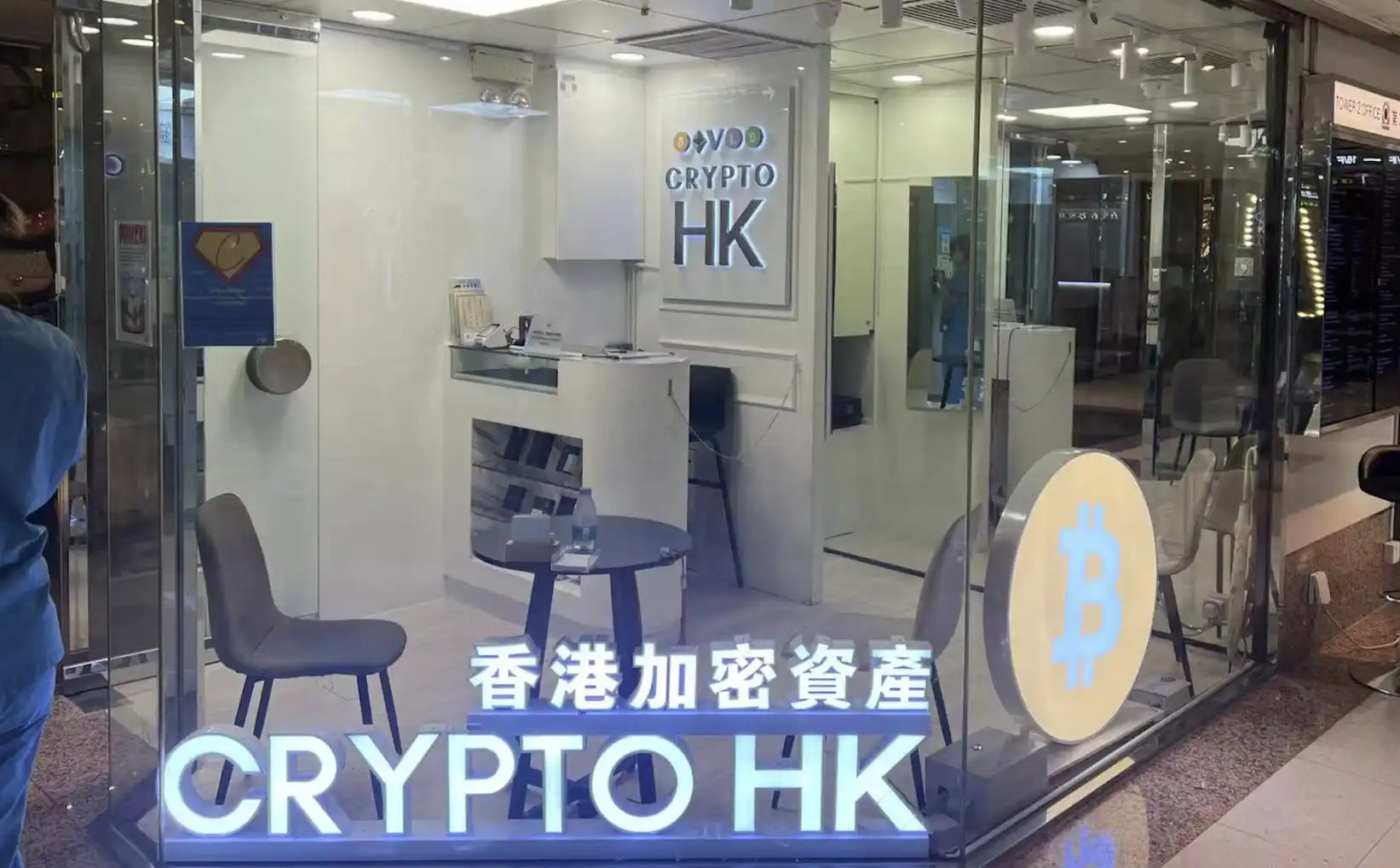Original Title: "Deep in the Public Opinion Storm, What Happened to HashKey?"
Original Author: Joe Zhou, Foresight News
The platform token has plummeted 85% in six months. What happened to HashKey, the first licensed retail cryptocurrency trading platform in Hong Kong? According to CoinGecko data, from December 30, 2024, to May 30, 2025, HSK dropped from a peak of 2.38 USD to 0.35 USD, marking an 85% decline over six months. The steep drop caught many ecosystem supporters, token holders, and even HashKey employees off guard, leading to significant investment losses.
"I feel like I want to defend my rights," lamented a former HashKey employee. There may be many employees at HashKey who share this sentiment. "It is estimated that over 200 current and former employees hold HSK."
"Almost all employees of the HashKey trading platform and public chain hold HSK, and many employees receive their bonuses in HSK." It is reported that internal employees at HashKey can convert up to 50% of their salaries into HSK tokens. Many employees not only hold HSK through bonuses but also convert their monthly salaries into HSK.
Behind HSK's poor performance, some deeper issues in HashKey's development are gradually surfacing. "High costs have made it difficult for HashKey to bear the burden, and it needs to seek further financing to support the continued development of its existing multi-line business," said another industry insider.
According to several informed sources, HashKey's financial situation has become quite tense. An anonymous industry insider stated: HashKey has recently undergone large-scale layoffs, with one-third of employees being dismissed, and some IT suppliers have experienced delayed payments or even contract terminations.
Two practitioners from different companies but close to HashKey stated: "HashKey has almost only six months of cash flow left." In response to this information, I sought verification from HashKey's official representatives. HashKey confirmed that it indeed issued some HSK to the team as incentives and acknowledged that compliance costs are high. However, regarding the recent large-scale layoffs, HashKey stated that this is not true, and they have not laid off any employees, maintaining that the global workforce remains over 600.
What exactly happened to HashKey that caused such a significant fluctuation in its token price? What is the current financial and profit situation, and through what channels is it seeking new financing? The development issues exhibited by HashKey reflect what problems have been exposed in the Hong Kong cryptocurrency industry's ecosystem over the past three years. This has become a topic of concern for many practitioners.
"Too Costly"
"Running a compliant cryptocurrency trading platform is too costly," pointed out an industry insider. Compliance is a series of licenses, and it is also a heavy burden on startups. As one of HashKey Group's core assets, HashKey Exchange is highly anticipated. However, it is also a genuine money pit.
· "(In the early days) 100 million USD was spent in less than three months," revealed an insider close to HashKey Exchange.
· "(Currently) HashKey Exchange needs to spend about 10 million USD per month on average." "Of this, 30-40% is for compliance costs."
· "At its lowest, it was over 5 million USD per month, and at its highest, it could reach 20-30 million USD." However, regarding the specific amount of monthly expenses, HashKey's official response indicated that it involves company secrets and cannot be disclosed.
Compared to other cryptocurrency trading platforms, HashKey Exchange has to bear more compliance costs from the outset, such as hiring a group of compliance executives, undergoing audits from three of the Big Four accounting firms, and purchasing insurance for users' assets… These are costs that other cryptocurrency trading platforms generally do not incur. These are the costs of compliance, which weigh heavily on compliant cryptocurrency trading platforms like HashKey.
I have previously revealed the compliance costs of cryptocurrency trading platforms in Hong Kong through several articles: applying for a VASP license costs between 20 million and 50 million HKD; regulations require at least two ROs (HashKey has four), and one practitioner revealed that each RO's salary ranges from 2 million to 5 million HKD; regulations require cooperation with insurance companies, necessitating payments to them; regulations require collaboration with auditing firms, for example, HashKey needs to work with three of the Big Four auditing firms, and an insider revealed that the annual fee for one of the auditing firms is 5-10 times higher than the fees for ordinary traditional industry projects, all of which incur additional costs… These are all part of the costs of being a "compliant cryptocurrency trading platform," which are continuously compounded.

As an emerging cryptocurrency trading platform, HashKey must bear more costs than its competitors before it has fully matured. Meanwhile, HashKey is seeking more financing channels. Public information shows that HashKey Group has brought in several institutional investors. In January 2024, HashKey Group completed a Series A financing round, raising approximately 100 million USD. An insider revealed that CMB and OKX were the main investors in this round. In February 2025, Gao Rong Capital invested 30 million USD in HashKey Group.
Although the financing amount is not low, as previously analyzed, the compliance costs of HashKey Exchange itself are extremely high. Assuming a monthly cost of 10 million USD, it has already spent over 200 million USD to date. This also puts pressure on the entire HashKey Group.
An anonymous institutional practitioner stated: "There is almost only six months of cash flow left." Under such pressure, HashKey has also begun comprehensive cost-cutting measures. An anonymous practitioner stated: HashKey has recently undergone large-scale layoffs, with one-third of employees being dismissed, and some IT suppliers have experienced delayed payments or even contract terminations. However, HashKey stated that this information is not true and that no layoffs have occurred.
Cost reduction is just one method; how to obtain more cash flow? Another practitioner stated: "HashKey is seeking more VC financing and has not given up on the idea of listing on the Hong Kong stock market."
Numerous Restrictions
Running a compliant trading platform is not only too costly, but normal revenue channels are also subject to many restrictions. HashKey Exchange has been providing cryptocurrency trading services to the public for over 18 months, yet many practitioners are puzzled: why can retail investors only trade four cryptocurrencies so far?
On August 28, 2023, HashKey Exchange officially opened cryptocurrency trading services to retail investors, marking its formal entry as Hong Kong's first licensed virtual asset trading platform to offer trading services for Bitcoin (BTC) and Ethereum (ETH). However, 18 months later, retail investors on HashKey Exchange can only trade four cryptocurrencies (BTC, ETH, AVAX, LINK), and even professional institutional investors can only trade around fifty to sixty cryptocurrencies on HashKey Exchange, according to an industry insider.
In contrast, platforms like Binance, Coinbase, and Upbit have launched hundreds of cryptocurrencies, and each new cryptocurrency launch is a good way to attract new users and trading volume.
This effectively squeezes its space for expanding users, flexible operations, and achieving higher profitability. And this is just the tip of the iceberg regarding the limitations on HashKey Exchange's profitability. In many respects, compliant trading platforms face stricter restrictions than other trading platforms when it comes to attracting users.
· "Almost every small and large matter needs to be reported to regulators," a HashKey Exchange insider once stated.
· "Some terms used in the crypto industry cannot be used directly in work groups and must be replaced with other codes. For example, the rocket emoji symbol commonly used in the crypto industry, 'to the moon,' cannot be used and must be replaced with a chili emoji symbol, making it feel like we are in a guerrilla war."
Compliance is a double-edged sword. HashKey's advantage lies in the fact that it can do things that many non-compliant cryptocurrency trading platforms cannot, such as attracting traditional capital flows, OTC, and RWA. However, its disadvantage is also evident: it cannot do many things that non-compliant trading platforms can do and is subject to strict restrictions. The problem is that many old businesses have been proven to be genuine market demands over time, while whether the new compliance directions represent real demands and how much profit potential they hold still require more time to prove.
"The Market Has Not Expanded, Many Players Have Entered"
Due to its early layout and cultivation, HashKey is becoming a benchmark and leading enterprise in Hong Kong's cryptocurrency industry. However, this market positioning is currently facing strong competition from formidable rivals.
Another pressure on HashKey in reality is that it has not truly risen, while strong players in other fields have already arrived on this not-so-broad battlefield, including local competitors in Hong Kong's crypto business like OSL and Futu; international competitors like Coinbase, Kraken, and Binance; as well as new local competitors in the public chain space like Ant Group's L2—Jovay.
HashKey Group has a relatively large footprint, with its business modules covering trading platforms (HashKey Exchange and HashKey Global), investment (HashKey Capital), OTC trading (HashKey OTC), infrastructure services (HashKey Cloud), tokenization services (HashKey Tokenisation), public chains (HashKey Chain), and brokerage services (HashKey Brokerage). These modules together form a highly compliant global Web3 ecosystem, serving institutions, family offices, professional investors, and retail clients.

Hong Kong virtual asset OTC stores are commonly found in shopping malls, office buildings, or street shops.
In terms of trading platform business, both HashKey Exchange and HashKey Global are facing intense competition. Unlike the Hong Kong market, HashKey Global's competitors are more diverse; for instance, in the European market, it has to compete with cryptocurrency giants like Coinbase, Kraken, Binance, Bitget, and OKX, as well as local trading platforms. Its competitors have already established stable and highly profitable territories. How HashKey can break through the encirclement through market-oriented methods is a challenge.
Currently, the main competitors of HashKey Exchange in Hong Kong are OSL and Futu. These two companies represent significant players in the market, not only with rich experience in new finance but also with strong capabilities. Potential competitor Futu has over 20 million users globally and is the largest retail brokerage in Hong Kong, with its Hong Kong users accounting for over 40% of the local adult population. It has accelerated its entry into the Hong Kong market and has developed its own cryptocurrency trading system. On May 7, Futu Securities International (Hong Kong) Limited announced the official launch of Bitcoin, Ethereum, and USDT deposit services.
Competitor OSL is backed by the "new first-tier giant" Bitget in the cryptocurrency industry, with ample funding and a complete ecosystem. Having chosen to list on the Hong Kong stock market, it has already become the first BTC stock on the Hong Kong stock exchange. Over the past year, OSL's stock price has risen by 91%, with a market capitalization of 8 billion HKD. In contrast, HSK's token price has dropped by 85% over the past six months, with a market capitalization of 47 million USD and a fully diluted valuation (FDV) of 360 million USD.
However, an informed source revealed that HashKey has been actively promoting VC financing and is also pushing for a listing on the Hong Kong stock market. If successful, this could provide HashKey with ample financial support.
In addition to the trading platform business, HashKey Chain is also facing competition from players in the public chain sector. Ant Group's L2 Jovay officially announced its launch in May, and its product manager has indicated that the mainnet is expected to go live in the third quarter of this year. As a leading fintech giant in Asia, Ant Group's strength in the new financial industry is unparalleled. Both Jovay and HashKey Chain regard RWA and Hong Kong as important development directions, and they may form direct competition in the future.
The emergence of these three powerful competitors is challenging HashKey's narrative as the "Hong Kong cryptocurrency unicorn." The Hong Kong market itself is not large, and the offshore market has yet to develop competitiveness. With many giants "snatching food" in such a limited space, HashKey's future has become increasingly uncertain.
What Problems is Hong Kong Facing Behind HashKey?
"Big thunder, little rain." This is the sentiment expressed by many Web3 practitioners when evaluating the development of Hong Kong's cryptocurrency ecosystem.
For example, after the approval of the BTC ETF in the U.S., there was an inflow of 45.7 billion USD; after the approval of the BTC ETF in Hong Kong, there was only 529 million USD, often just the scale of net inflow for the U.S. spot BTC ETF in a single day. After the approval of the U.S. Ethereum spot ETF, there was a total net inflow of 2.9 billion USD; after the approval of the Hong Kong Ethereum spot ETF, there was only 58.44 million USD in total net inflow. Similarly, Hong Kong's total net inflow often falls short of the daily net inflow of the U.S. Ethereum spot ETF.
Moreover, many times, Hong Kong's policy announcements are often earlier than those in the U.S., such as the Ethereum spot ETF, stablecoin policies, and Ethereum staking policies. However, they have all been early birds that arrived too late.
In comparison to the cryptocurrency markets in South Korea and Dubai, Hong Kong's crypto ecosystem is also showing signs of fatigue. Retail users in South Korea are very active, making its cryptocurrency ecosystem exceptionally vibrant. Many Web3 project entrepreneurs hope to target South Korea as an important market, while Dubai's open policies have allowed it to seize the offshore center, with numerous trading platforms and OTC players choosing to channel funds into Dubai rather than Hong Kong.

"The first year of the Hong Kong crypto summit was lively, but the second and third years have been much quieter," said one practitioner. "Over the past three years, Hong Kong has gradually lost confidence in the cryptocurrency market." This may also explain part of the reason why Hong Kong's leading concept token HSK has plummeted; people's belief in whether Hong Kong can become a global Web3 center has already been shaken.
The U.S. has nearly 50 billion USD in net inflow for BTC spot ETFs; what does Hong Kong have? The U.S. has Coinbase, Europe has Kraken, and Dubai has Binance, Bybit, and other top cryptocurrency companies globally; what does Hong Kong have? South Korea firmly holds the active local retail market, and Dubai tightly grips the offshore center market; what has Hong Kong successfully captured? These questions seem to remain unanswered for Hong Kong's cryptocurrency ecosystem and its leading enterprises.
免责声明:本文章仅代表作者个人观点,不代表本平台的立场和观点。本文章仅供信息分享,不构成对任何人的任何投资建议。用户与作者之间的任何争议,与本平台无关。如网页中刊载的文章或图片涉及侵权,请提供相关的权利证明和身份证明发送邮件到support@aicoin.com,本平台相关工作人员将会进行核查。




